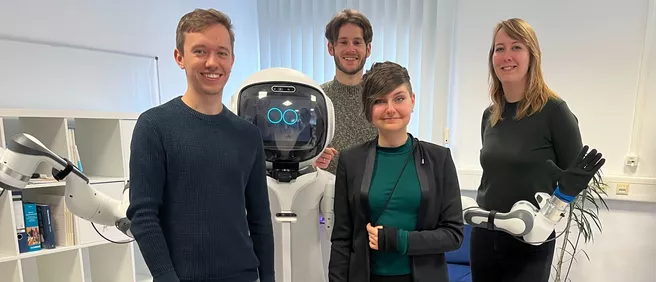The Responsible Robotics & AI consortium project will come to an end in the summer. What is it about?
In the research project funded by the Bavarian Research Institute for Digital Transformation (bidt), we are looking at the transformation of work processes through the use of robotics and artificial intelligence. We consider social, ethical and legal aspects. And we do this very pragmatically, using a bottom-up approach to talk to people and professional groups who are primarily affected. In the field of robotics in healthcare, for example, this includes nursing scientists, nursing students, experts for the validation of robotic systems in hospitals, and surgeons. We discussed opportunities and challenges with them and got a kaleidoscope of opinions and perspectives.
Which prevails, optimism or scepticism?
This is very context-specific. Nursing students have often seen the opportunities that lie in the use of robotics and automation of processes, especially when it comes to documentation requirements. In nursing science, the question is increasingly being asked to what extent the use of robotics really helps. It is important for colleagues in this field to set up evidence-based studies under well-considered framework conditions in order to ultimately get a fair comparison. For example, under the question of what care can achieve under optimal conditions and how this performance changes through the use of robotics and AI.
Datarecorder enables evidence for ai decisions
Back in 2017, Marina Jirotka, a professor of human-centred computing at Oxford University, coined the term "ethical black box". It should contain all the data that is generated in the interaction of humans with the robot …
That's what our system does, but we don't call it a black box, we call it a more neutral "data recorder" so that the association with an opaque black box into which one has no insight does not arise in the first place. For the use of AI, our interlocutors saw many questions of responsibility still unanswered, e.g. who is responsible if something goes wrong? In order to investigate this and subsequently also be able to prove decisions made by the AI, we record the interaction of the human with the robot. This documentation is especially important for vulnerable groups such as the elderly, the impaired or the disabled, with whom health professionals have to deal. What is special about us is that we do not simply record data and store it in a file. We prepare them and show, for example, all the forces that occur in a virtual environment. This makes the human-robot interaction more transparent and comprehensible. The Munich Institute of Robotics and Machine Intelligence (MIRMI) has already developed a corresponding application example for the service robot Garmi, namely for a rehabilitation application.
You are an industrial engineer, have a Master's degree from TU in Science and Technology Studies (STS) and are writing your doctoral thesis on AI and robotics. What is it about exactly?
I look at what research and knowledge culture is emerging around geriatrics research. The project is a lot about demos, prototypes and cross-chair collaboration. The success of research in this field depends very much on interdisciplinary cooperation. I try to understand how early-career researchers in particular perceive this environment, how they deal with research-specific challenges and how they organise themselves.
Further information on the "Responsible Robotics (RRAI)" consortium project
Ethical and Social Aspects of AI-based Transformations in the Healthcare Work and Knowledge Environment": https://www.bidt.digital/forschungsprojekt/responsible-robotics-rraiethische-und-soziale-aspekte-von-ki-basierten-transformationen-in-der-arbeits-und-wissensumgebung-des-gesundheitswesens/
The research project involves Prof. Alena Buyx from the Institute for History and Ethics of Medicine, Prof. Sami Haddadin from the Munich Institute of Robotics and Machine Intelligence (MIRMI) as well as the Chair of Robotics and Systems Intelligence and Prof. Ruth Müller from the TUM School of Social Sciences and Technology at the Technical University of Munich (TUM).
